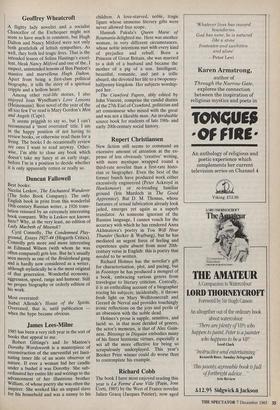Rupert Christiansen
New fiction still seems to command an excessive amount of attention at the ex- pense of less obviously 'creative' writing, with more mystique wrapped round a third-rate novelist than a first-rate histo- rian or biographer. Even the best of the former bunch have produced work either excessively engineered (Peter Ackroyd in Hawksmoor) or re-treading familiar ground (Iris Murdoch in The Good Apprentice). But D. M. Thomas, whose fantasies of sexual lubrication already look jaded, emerges yet again as a superb translator. As someone ignorant of the Russian language, I cannot vouch for the accuracy with which he has rendered Anna Akhmatova's poetry in You Will Hear Thunder (Secker & Warburg), but he has mediated an urgent force of feeling and experience quite absent from most 20th- century verse in English: this is poetry that needed to be written.
Richard Holmes has the novelist's gift for characterisation, plot, and pacing, but in Footsteps he has produced a mongrel of a book, embracing various genres from travelogue to literary criticism. Centrally, it is an enthralling account of a biographer tracing his subjects; incidentally, it throws fresh light on Mary Wollstonecraft and Gerard de Nerval and provides touchingly ironic reflections on the joys and perils of an obsession with the noble dead.
Holmes's prose is supple, sensitive, and lucid: so, in that most derided of genres, the actor's memoirs, is that of Alec Guin- ness. Blessings in Disguise embodies many of his finest histrionic virtues, especially a wit all the more effective for being so scrupulously underplayed. This year's Booker Prize winner could do worse than to contemplate his example.


































































 Previous page
Previous page